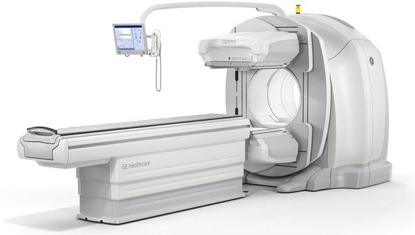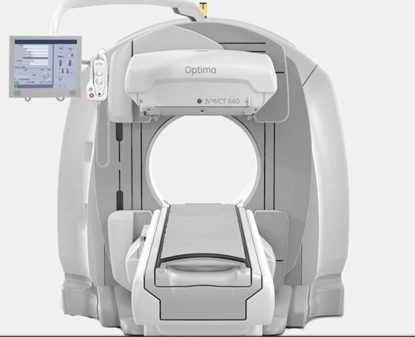Nuclear Medicine (SPECT/CT)
Nuclear Medicine
Territory X-Ray Services’ Nuclear Medicine department utilises hybrid (SPECT/ low-dose CT) scanners. Nuclear Medicine examinations are safe and non-invasive. Small amounts of a radiopharmaceutical (most have a short half-life of approximately 6 hours) are administered to see how well it is taken up or passes through an organ or system, using gamma cameras which detect these small amounts of radiation. Low-dose CT is sometimes used to enhance image quality and/or localise uptake of such radiopharmaceuticals in the body.

What is a Nuclear Medicine?
Nuclear Medicine looks at how different systems and organs work (physiological process) in your body, and how some diseases can have an effect on how they work.
From what we know in how systems work in the body, diagnostic nuclear medicine can apply that knowledge and assess a physiological process by the administration of a radioactive substance and image that substance being taken up or passing through an area of interest.
More the 95% of the workload in nuclear medicine is diagnostic, and less than 5% applies to therapy.
The Nuclear Medicine cameras used at Territory X-Ray Services are the latest SPECT/CT systems which allow 3-D nuclear medicine (SPECT) data to be fused with 3-D anatomical data (CT),where required.
What about Radiation Dose?
The radiation dose to each patient varies depending on what study is being performed but is almost always small and safe. In nearly all cases, the radiation dose to a patient is no more than what one would receive from a CT scan or an x-ray of the back, and is often less. The half-life of the most common radioisotope used in imaging is approximately 6 hours.
If you are pregnant, please inform your requesting clinician and Territory X-Ray Services Nuclear Medicine department.
If you are unsure of your pregnancy status, please discuss this with your requesting clinician or Territory X-Ray Services Nuclear Medicine department prior to making an appointment.
If you are breastfeeding….
Nuclear Medicine studies can be performed on most patients who are breast feeding, however cessation periods may apply depending on the study being performed. Please inform Territory X-Ray Services Nuclear Medicine at the time of making your appointment if you are breast feeding.
The radiation dose to children having a nuclear medicine scan is adjusted accordingly based on their weight.
Current technology permits nuclear medicine and CT to be done at the same time on the SPECT/CT system when required. The radiation dose from that CT is low (non-diagnostic), and is used for the purposes of localising a nuclear medicine event in the body or counteracting the effects of attenuation from structures within the body.
How long does it take?
Nuclear Medicine studies vary in length of appointment depending on what study is being asked to be performed. Some studies can be done within an hour, most studies can be completed within a few hours, but there are some exams which may involve having a scan over a number of days. Information will be made available regarding study durations when an appointment is made.
Is there any special preparation?
For most studies there is little or no preparation.
As Nuclear Medicine studies involve examining physiology, medication and dietary habits may influence outcomes in some studies. You may be asked to stop medications or fast or withhold caffeine prior to your nuclear medicine study, as examples.
At times, medications are administered during a nuclear medicine study, and preparations may be required to gain full effect from such medications being used for your nuclear medicine study.
What to bring to your appointment
When attending for your appointment, you will need to bring the following items with you:
- your Medicare Card
- your doctor’s referral form
- any previous films or disks that are relevant to the procedure (for example, please bring your chest x-ray films if presenting for a CT chest examination)
For Nuclear Medicine tests offered at Territory X-Ray Services please download
For more information about Nuclear Medicine Services
The Australasian Association of Nuclear Medicine Specialists (AANMS) has patient and referrer information available by clicking on the link below.
https://aanms.org.au/wp-content/uploads/2020/02/AANMS_REFERRERSGUIDE_2014_PRINT.pdf
While this information is designed to be as informative as possible, it is very brief in nature and should not replace the advice or guidance of your doctor or preferred healthcare professional.

